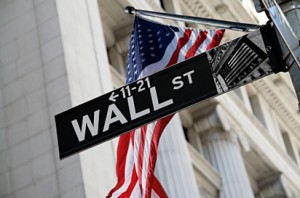 By Steve Johnson and Jeremy C. Owens, San Jose Mercury News –
By Steve Johnson and Jeremy C. Owens, San Jose Mercury News –
SAN JOSE, Calif. — The most successful technology IPO in history roared to a start Friday morning, with sales of Facebook shares opening at $42.05 — well above the pre-set price of $38 — and the trading volume was exceptionally heavy.
The stock’s price bounced around in early trading, dropping several times back to $38. But by mid-morning it was back up to above $41. After just two hours, more than 345 million shares had been traded, raising the possibility that Facebook could become the most traded initial public offering ever. The record is held by General Motors, with 458 million shares sold on its first day, according to the Wall Street Journal.
The company’s feverishly-anticipated Wall Street debut — initially set for 8 a.m. — had been held up about 30 minutes after NasdaqOMX Group said it was “experiencing a delay” in opening shares of Facebook, according to Bloomberg. But with the stock now officially trading, investors could boost the company’s record $104 billion valuation even higher.
Barron’s reported that Facebook shares were being quoted at $45 on Nasdaq before trading began. And the Associated Press said Intrade, the online betting market, was predicting a 77 percent chance that the stock would close at $45.
But other social media stocks weren’t faring as well in the early going. Trading in Zynga was halted after the stock fell more than 13 percent, reaching an all-time low at $7.17. Groupon fell about 6 percent and LinkedIn was down more than 1 percent. The suspension in Zynga’s shares, prompted by a market circuit breaker that kicks in when trading gets volatile, was supposed to have lasted five minutes, but went on much longer.
Several smaller social networking companies had seen their stocks dip Thursday, including LinkedIn, Jive and Yelp. Analysts said that may be a result of a broader market decline, although some suggested investors may be freeing up funds to buy Facebook instead.
Max Wolff, an analyst with Greencrest Capital in New York, said Facebook’s opening price of just $42 a share indicated surprisingly soft demand, given that the company’s shares had been trading for more than that in the secondary markets.
The fact that the stock struggled to gain altitude Friday morning, he said, reflected “a tug of war between institutional selling and retail buying, which always makes for volatility.”
Wolff, however, did not expect Facebook’s stock to dip below its opening price of $38 a share, saying that the underwriters and other big investors have put in place automated “buy” orders at that price.
He also was puzzled by the market’s treatment of Zynga, noting that at the $7.15-a-share range at which it was trading aroundmid-morning, its market cap of $5.74 billion represents far less than its contribution to Facebook’s revenues. According to its IPO filings, Facebook made 12 percent of its money last year from Zynga’s social games. So if the stock market has deemed Facebook to be worth $100 billion, Wolff said, its valuation of Zynga’s stock doesn’t compute.
Facebook cofounder and CEO Mark Zuckerberg rang the opening bell for the Nasdaq stock exchange a stage set up outside at the company’s Menlo Park headquarters at 6:30 a.m. Pacific time Friday, after employees spent all night coding in one of the company’s regular “hackathons.” Zuckerberg was joined on the stage by Chief Operating Officer Sheryl Sandberg and dozens of other employees.
As soon as Zuckerberg pushed the button to ring the bell, his Facebook page gained a status update that read “Mark listed FB on Nasdaq.” The company later revealed that a group of Facebook engineers “hacked” the Nasdaq bell mechanism to automatically trigger the update over a mobile phone connection. The update tagged Sandberg and four other Facebook executives.
Facebook completed its initial public offering Thursday, pricing the stock at $38 and selling 421 million shares, which raked in $16 billion at a record valuation for a U.S. company at IPO time. The world’s most popular social network is likely to sell another 63 million shares, known as an overallotment, to bring the total proceeds to $18.4 billion, the second highest total in history for a U.S. company.
Early interest in the new stock was so feverish that Facebook this week raised the potential range of its IPO price, which was originally listed as $28 to $35. At the final price of $38, most of the shares sold in the IPO went to institutional funds and other big clients of the IPO’s underwriters.
“Given the demand that they had, it doesn’t take a genius to predict the stock is likely to have a pretty good day,” said Sterne Agee analyst Arvind Bhatia. “How high does it go? It’s hard to tell.”
Facebook’s growth has fueled an explosion of smaller companies that build games and other applications for the site, but the success of the IPO is also likely to spur broader growth in the tech industry, according to Bruce Aust, an executive vice president at the Nasdaq exchange. Aust, who was at Facebook headquarters for the ceremony Friday morning, said 37 tech companies have filed regulatory documents to go public on the exchange in coming months.
“It definitely is a global phenomenon,” Aust said of Facebook. “I can understand the excitement around it, because it’s probably the Internet site I spend the most time on in my personal life. It’s part of daily life.”






